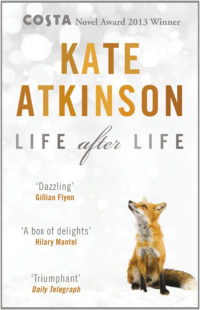One could lose everything in the blink of an eye, the slip of a foot
 Life After Life
Life After Life
by Kate Atkinson
Way back when I was working for my student newspaper as the arts and books editor, I reviewed a short-story collection called Not the End of the World by Kate Atkinson. It wasn’t her first book, but it was still early in her career. I loved it and vowed to pick up the novels she had previously written. But then more than 16 years passed and my only further Atkinson consumption was the TV series Case Histories starring Jason Isaacs as her character Jackson Brodie. Which was excellent.
In 2013 and 2014 everyone was talking about Life After Life. It won the Costa Novel Award and the admiration of all my favourite book bloggers. And I still didn’t read it until the brief period of snow that we had a few weeks back, which made a wintry book feel appropriate. And maybe that’s for the best. I really enjoyed this book, but I suspect it wouldn’t have stood up to the hype, for me at least.
I like the concept: Ursula is born to Sylvie Todd during a snowstorm on 11 February 1910 and dies a few seconds later. She is born again and lives a few years before dying. The cycle keeps repeating: 11 February 1910, snowstorm, Ursula’s birth. However many years she lives, it all starts again at that same moment, same place.
“Ursula opened her milky eyes and seemed to fix her gaze on the weary snowdrop. Rock-a-bye baby, Sylvie crooned. How calm the house was. How deceptive that could be. One could lose everything in the blink of an eye, the slip of a foot. ‘One must avoid dark thoughts at all costs,’ she said to Ursula.”
The timing of her birth means that much of the narrative is concentrated on the two world wars. Ursula has a large family and her siblings’ lives are also under threat with each new start. She begins to have presentiments, or déjà vu of her past lives, which warn her of danger to herself and others. Sometimes this is enough to successfully evade danger, sometimes it is not. Some deaths repeat because they are so hard to avoid.
There is a little of Sliding Doors in this – the idea that tiny moments can effect huge changes. But there are also many similarities. Her childhood is always roughly the same – being largely outside of her control – and of course that has a large bearing on the adult she becomes. Her happiness and confidence vary more than her jobs and romantic partners do, which I found interesting.
It’s an epic tale, not only covering an eventful chunk of British history, but also repeating it over and over, usually from slightly different angles. Ursula’s awareness of her reincarnation might be limited, but it is enough for her to begin to explore the idea in some of her lives. There are lives when she is consciously working towards a goal: saving her own life, or someone else’s, or even changing the course of history. But on every death she starts over again, back in that snowstorm in the English home counties.
“Pamela’s support for the expeditionary force had taken the form of a mass production of dun-coloured mufflers of extraordinary and impractical lengths. Sylvie was pleasantly surprised by her elder daughter’s capacity for monotony. It would stand her in good stead for her life to come. Sylvie lost as stitch and muttered an oath that startled Pamela and Bridget. ‘What news?’ she asked at last, reluctantly.
‘Bombs have been dropped on Norfolk,’ Bridget said, proud of her information.
‘Bombs?’ Sylvie said, looking up from her knitting. ‘In Norfolk?’ ”
It’s haunting, the idea that maybe one of these lives was the perfect one, the best version, and yet the cycle didn’t end there. Maybe it will never end. Ursula will never know if in one of those lives the world that she left behind was a better place due to her actions. And of course it isn’t just Ursula whose choices affect her life. Everyone else we meet is also experiencing life over and over, and though Ursula seems to be the only one with obvious awareness of that, there are other people who step in to help at a crucial moment when they didn’t previously, as if subconsciously they too knew on some level what would happen otherwise.
Atkinson’s writing is very absorbing, so this didn’t feel like a 600-page book. She has a sense of humour that alleviates the darker themes and she creates great characters. It’s a good idea well executed, and my only real complaint is that so very much of the novel is spent on the world wars. They were of course important events in world history, but I sometimes feel that they are over-represented in film and literature. I know why Atkinson chose this time period (if it wasn’t clear from the book itself, my copy includes an author Q&A at the end that spells it out), but it feels like too obvious a choice. This is in a way a time-travel narrative, and it zeroes in on the most common time-travel trope. It’s done well, but it could have been more original.
Published 2013 by Doubleday.
Source: Christmas present from my sister.
Ahh.. finished this and came to find out your thoughts. I wanted to see if you thought Sylvie had the same “skill”.. her prescience towards the end, in preparation for Ursula’s birth.. and her consistent suicide made me ponder whether she’d hit a wall, and left the rest to Ursula.
Ooh, interesting theory. I think I began to wonder about a few other characters but I wasn’t convinced any of them were conscious of it the way Ursula is.